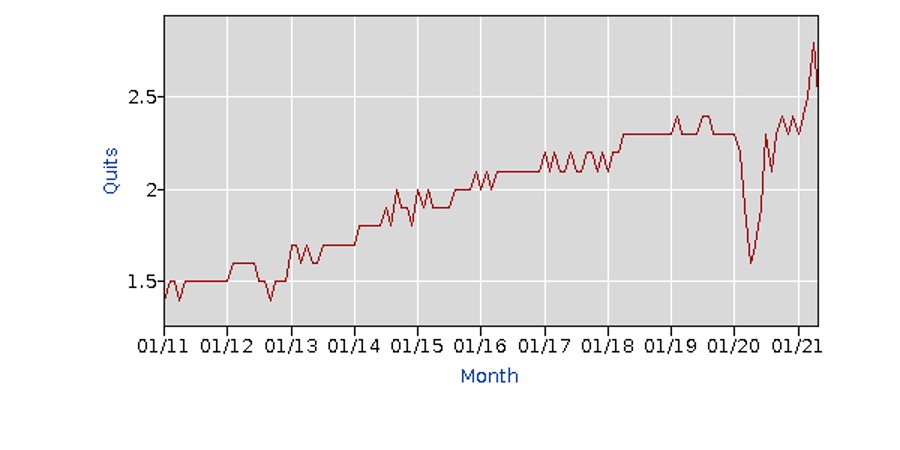AI, deportations, tariffs, and birthrate declines are reshaping America's workforce—blue- and white-collar alike. From baby boomer exits to AI disruptions, breaking down the workforce challenges no leader can afford to ignore.
The Best 2-Word Description for Recruiting Today

There are so many good choices and many of them are preceded with “too”. Consider “too many openings”, “too few candidates”, or perhaps “applicants too picky”…but the best description I heard came from a CEO of a manufacturing company who said this about today’s recruiting: Doom Loop…defined by Jim Collins in Good to Great as “a painful cycle of decline”.
That CEO was describing an everyday scenario that I heard that same day from a healthcare executive too, that recruiting candidates who stay a month and leave is like a dog chasing its tail. If you can’t increase the net number of workers because for each one that joins another one leaves, you can never…ever…increase productivity.
Maybe this is why some companies say their recruiters are responsible for recruiting and retention. That way they can interview them when they come in and then conduct a worthless exit interview when they leave. Another doom loop example.
Every one of us has been inundated with data about how difficult it is to recruit. Moms staying home with kids, older workers retiring early, some on the couch collecting unemployment, others holding out for more money or wanting to work from home. What has not been told, though, is the incredible number of workers who have jobs and are leaving them. And these aren’t people getting fired or laid off. These folks are quitting.
The below chart is from our Bureau of Labor Statistics that reports voluntary quits. Note the pattern, that we came out of the great recession and as jobs grew so did quits, too. Quits dropped some in pandemic 2020 but just by 14%. But in 2021 quits are soaring such that more employees voluntarily quit their jobs in May than any month previously, ever. And by a wide margin.

This is the doom loop chart. And I would bet more than half of these quits are in the first 60 days on the job with new employers.
Let’s be real. Most companies, most recruiters, and most on-the-floor operations leaders aren’t even thinking about retention. They need bodies to get work out the door, whatever type of work that is. The most stunning example I’ve seen was walking through the Atlanta airport mid-day in June when the only food available was from Starbucks and Chik-fil-A. Every other food outlet was chained to the floor because they couldn’t find workers. Who saw that coming?
Is it possible to fix this, in these tougher-then-ever recruiting times? The answer is YES. In caps.
A major manufacturing company with 9 U.S. locations faced rocketing turnover among first-line workers…the ones who push their products out the door. Our analysis pointed out that half their new hires never reached 60 days. Sound like your company?
From there we established a goal that a full 80% of new hires would see their 60th day on the job. Goals must be accompanied by fresh-thinking solutions, though, and we put these into place:
- First, the goal was owned by each plant’s recruiter, new-hire trainer, and all team leads and supervisors. The director of manufacturing over-ruled other local opinions by smartly pointing out that team leads are in the face of workers every day, no matter whether they are on the clock or not.
- Next, we trained those team leads to conduct Stay Interviews and forecast how long each employee would stay…and despite the doubts of many at the top, those team leads learned to ask 5 questions, listen, probe to learn more, and solve the daily problems that frustrated their teams like shoddy equipment or others not doing their jobs.
- The team leads conducted those Stay Interviews on each employee’s 5th day and 30th day…with no variance…because they knew that 80% of those new hires must reach their 60th day.
- While team leads bore the heaviest retention responsibility, all who owned the new hire goal met once per week to ensure they reached their 80% goal. Imagine entering a room and being handed a piece of paper with the names of every new hire in their first 60 days. These accountability teams talked through every employee’s status for staying the remaining number of days until 60…followed by discussion of a second list of those who had left.
- The one-two punch of team leads’ building individual trust with each new hire followed by weekly team accountability sessions caused these 9 manufacturing plants to smash their 80% retention goals.
Contrast this against a new client that cannot retain new hires for 30 days…and where not one of their first-line leaders would say they know each of their employee’s names. We’ll fix that.
Tough recruiting is getting the headlines…but we are spinning in the doom loop without smart retention practices that work.



